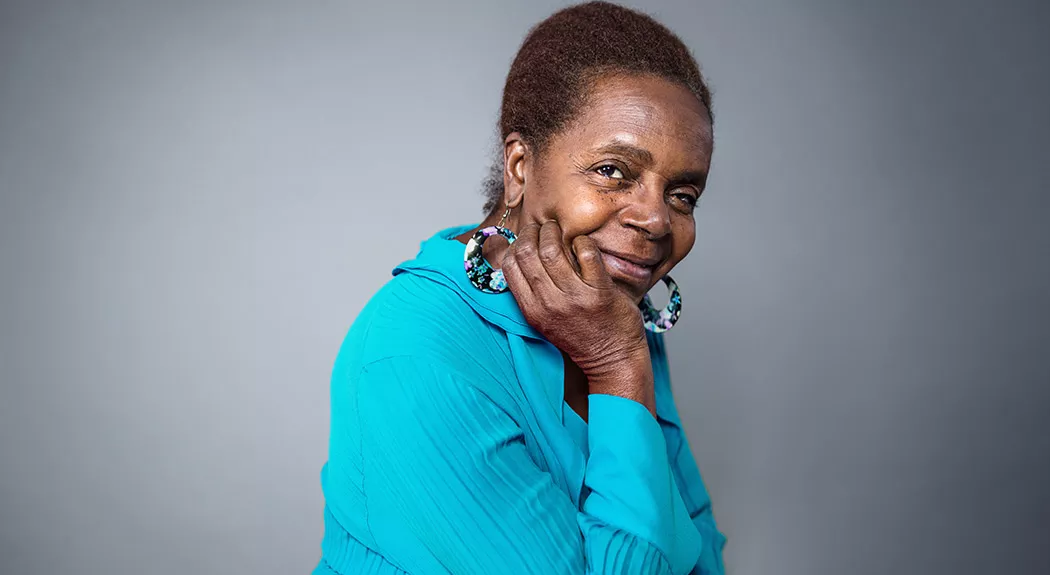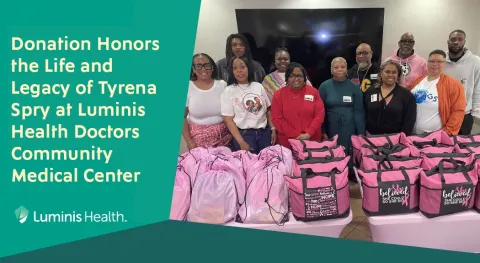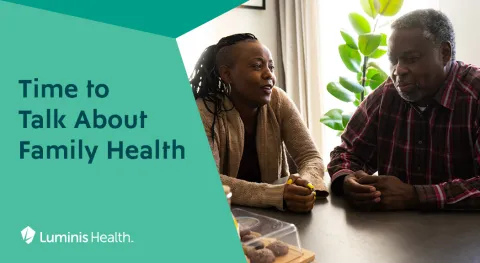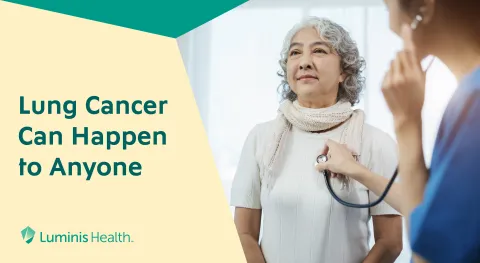Effective January 20, 2026, masks are encouraged for all staff, patients and visitors at all Luminis Health locations and will remain encouraged through the end of the influenza season. Thank you for your patience as we continue to care for our community.

Where care extends beyond treatment
Navigating cancer treatment is about so much more than showing up for appointments. Your cancer journey can affect every aspect of your life — keeping you from work, from your favorite activities and sometimes even from your loved ones.
And while it’s sometimes hard to admit you need help, help is always close by. In fact, the Geaton and JoAnn DeCesaris Cancer Institute has built programs around all of your needs — physical, mental, financial, spiritual or emotional. Because we profoundly believe these programs will light the way to better outcomes.
Learn more about our cancer support services and how they can help you.
Genetic testing to help you find answers
Your genes hold many secrets to your health. And we’re now better able to understand those secrets, thanks to genetic testing. Genetic testing and counseling services can help you and your family better understand cancer risks, allowing you to make informed and empowered healthcare decisions.
You can count on us to help you decide if genetic testing is right for you and your loved ones. And our support won’t end after you get your test results. Together, we’ll review your options and give you the time, space and confidence you need to make the best decision for you.
Financial counseling to help ease your worries
Your most important job during cancer treatment is to get better. That can be hard when you’re worried about the financial impact of your care. Our financial counselors are here to lighten that burden. We’ll connect you and your family to financial assistance (if you qualify), explain confusing insurance requirements and benefits, and make a plan so you can stay focused on what really matters – getting back to all the people and activities you enjoy.
Specialized care to help keep your body strong
We’ll be at your side for every twist and turn — before, during and after treatment.
Our physical, occupational and speech therapists will recommend safe and easy exercise and stretching routines to keep your muscles strong during treatment. And we’ll be here with proven rehabilitation programs to help you overcome any side effects after treatment, like lymphedema, swallowing trouble, pain and much more.
What you eat and drink can also have a big impact on how you feel, but you may experience changes in your appetite and tastes that make it difficult to get the nutrition you need. Our registered dietitians and nutritionists are specially trained to help you overcome the unique obstacles that come with cancer treatment. Working closely with you, we’ll create a personalized eating plan that ensures you get all the nutrients your body needs.
Social services to help support your unique needs
Everyone copes with cancer a little differently. That means every patient needs different support. Our social services — which include financial assistance; connections to community resources or professional guidance for any of the physical, mental and emotional challenges that come with a cancer diagnosis — are far reaching and wide ranging, so you can find the help you need.
Nurse navigators to help you keep it all straight
Constantly navigating appointments, treatment plans and recommendations from your care team can become overwhelming. That’s why we’ll make sure you’re assigned a nurse navigator that can help you keep it all straight. Our team of nurse navigators will streamline your care and – just as importantly – offer up a comforting, consistent presence during a stressful time. We’ll take care of the details, while you focus on healing.
Spiritual care to help your heart heal
Spiritual health is so much more than religion. It’s about finding an inner peace that can help you and your loved ones achieve life balance. For you, that may include sitting in a chapel and praying. Or, it could mean meditation, volunteering, forgiveness or optimism. No matter your beliefs, our spiritual care team is here to help you and your family find that sense of calm. And we’ll start by listening to you and your needs.
Palliative care to help you manage painful symptoms
Sometimes, the hardest part of dealing with cancer is managing painful symptoms. And palliative care may be the answer. This important medical service helps relieve suffering and improve your quality of life during treatment.
At the DeCesaris Cancer Institute, our palliative care team includes physicians, nurse practitioners, social workers and chaplains who share the same goal: Helping you and your loved ones.
That support can look very different depending on where you on your path to healing. We’ll work hard to help you:
- Find ways to ease your pain and discomfort from treatment
- Create realistic goals for your care
- Communicate openly and honestly with your entire care team and family
- Bring family members together for productive conversations
- Coordinate care among treatment teams
- Bring peace and comfort during end-of-life situations
Survivorship and caregiver support to help lift your spirit
Your care doesn’t end when your treatments do. Because, believe it or not, sometimes ending treatment can be a little jarring. After all, you and your loved one have grown accustomed to regular appointments, meeting with doctors and having a nurse just a phone call away. Take heart in knowing you’ll continue to work closely with your primary oncology provider and primary care provider to ensure you stay healthy, well and strong.
Cancer is a journey, and everyone’s path is different. Sharing your story, whether it’s as a cancer survivor or caregiver, can also go a long way in helping you (and others in your group) heal. Here, as a part of our survivorship or caregiver support program, you can connect with people in similar situations; who understand the challenges you face and can give you the safe space you need to process your emotions.
We offer many different types of support groups, including groups for patients, survivors, family members. We also have support groups for specific cancers, including head and neck, lung, prostate and breast.
We’re here to meet you where you are
Sometimes, asking for help is the hardest part. And during a challenging time like a cancer diagnosis, it can be hard to even know what you need. We’ve built our support services for patients just like you. If you’re not even sure where to begin, let your nurse navigator, doctor or any member of your care team know what’s on your mind. We’ll take it from there, help you find the solutions and support you need.
Call us anytime at 443-481-5800.



